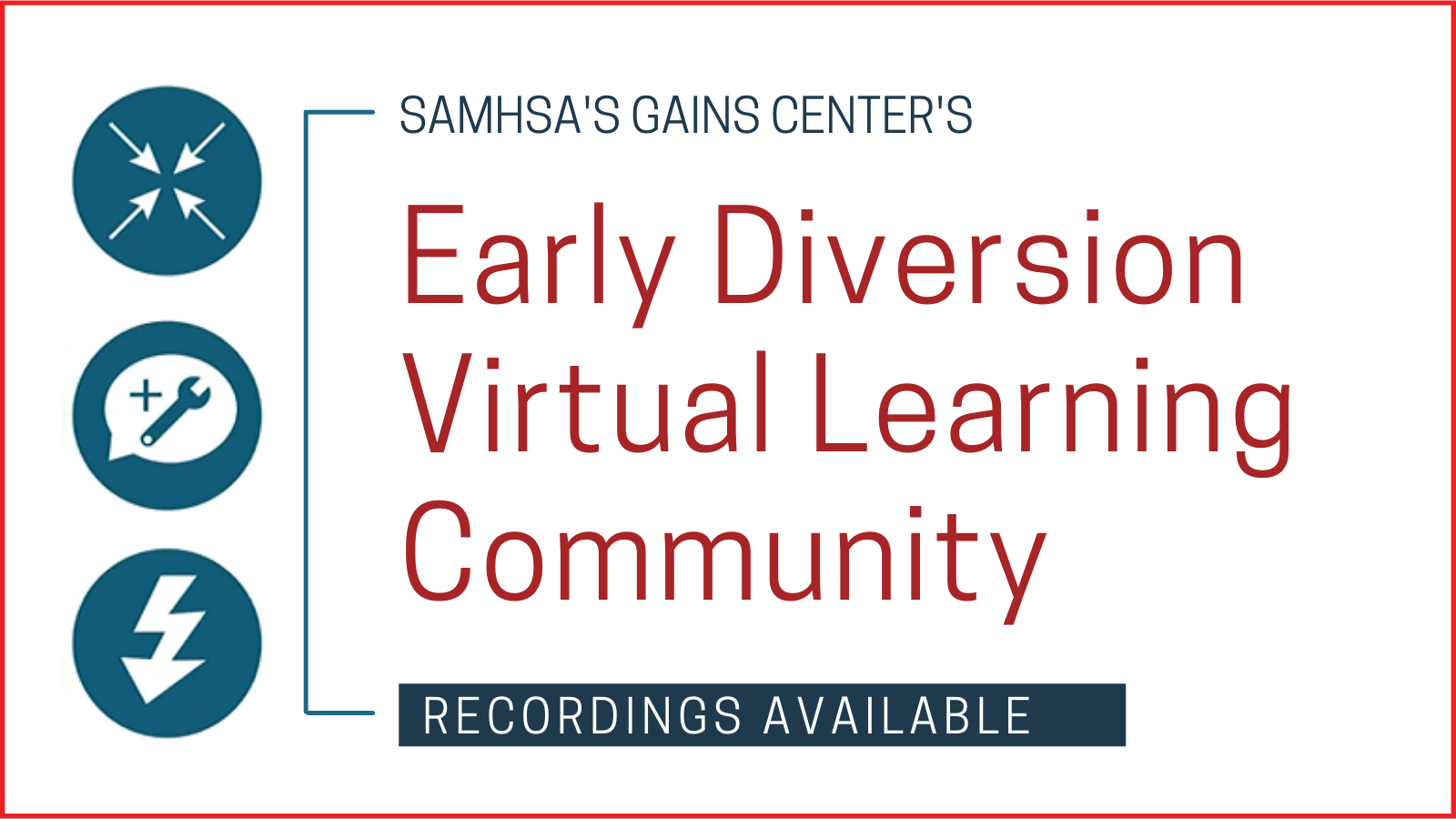Access the recordings of SAMHSA’s GAINS Center Early Diversion Virtual Learning Community, a five-part series on enhancing systems responses for people with mental and substance use disorders who are justice-involved or at risk for justice involvement. Stay informed on future events by signing up for the GAINS Center mailing list.
Part 1: Strategies for Addressing Treatment Engagement Challenges with Certain Individuals
Click here for the Part 1 recording.
Many communities face challenges engaging certain individuals in treatment. These individuals cycle through homelessness, incarceration, and crisis services. The question arises, are we speaking of individuals who are resistant to services or services that are resistant to these individuals? While there is no “one size fits all” approach, there are specific strategies, services, and practices that communities have developed to address the support needs of individuals who have difficulty engaging in services. These strategies include care coordination, targeted case management, data-driven responses, motivational interviewing, peer-based responses, and trauma-informed services. Presenters addressed multi-faceted approaches to improve individual outcomes and system response.
Presenters
- Steve Miccio, CEO, People USA, Poughkeepsie, New York
- Mark Giuliano, MSW, Director of Community Support, Department of Community Mental Health, Westchester County, New York
Part 2: Addressing the Critical Need for Housing and Strategies to Overcome Barriers to Improve Housing Access
Click here for the Part 2 recording.
Housing is a critical need for individuals experiencing homelessness who are in crisis and at risk for justice involvement. Services alone cannot address the overwhelming disruption homelessness contributes to well-being and health. Barriers to accessing housing include criminalization of homelessness, lack of partnership development, funding issues, and navigating myths and realities related to securing housing. Presenters addressed comprehensive strategies to improve housing access, which is key to early diversion.
Presenters
- Julia Orlando, EdM, MA, CRC, DRCC, Director, Bergen County Housing, Health and Human Services Center, New Jersey
- Letitia N. Robinson, MSW, MPA, Assistant State Director, Office of Supportive Housing, Georgia Department of Behavioral Health and Developmental Disabilities
Part 3: Integrating Forensic Assertive Community Treatment (FACT) Teams into Early Diversion Response
Click here for the Part 3 recording.
Forensic Assertive Community Treatment (FACT) Teams are well-researched and effective programs for individuals who are justice involved, many of whom experience homelessness and are involved in multiple systems of care and support. Access to FACT teams may be limited due to funding or functional requirements. Presenters provided an update on FACT research and discuss approaches to funding, criminal justice partnerships, and improving access to FACT services.
Presenters
- Jessica Klaver, PhD, Senior Director, Behavioral Health Services, CASES
- Gary S. Cuddeback, PhD, MSW, MPH, Berg-Beach Distinguished Professor, School of Social Work; Research Fellow, Cecil G. Sheps Center for Health Services Research; University of North Carolina at Chapel Hill
Part 4: Developing and Maintaining Collaborative Relationships with Law Enforcement That Survive Changing Times
Click here for the Part 4 recording.
Access to treatment services, staffing, and service models have been altered due to the pandemic and recent reframing of law enforcement and behavioral health partnerships. Law enforcement practices have also been altered, in particular regarding training initiatives and reductions in arrests. However, the treatment, service, and support needs of individuals with mental and substance use disorders encountered by law enforcement must still be addressed. In this webinar, presenters will describe how community partnerships with law enforcement, such as Crisis Intervention Team programs, have adapted to address the needs of individuals in crisis or in contact with law enforcement. Guidelines were introduced for communities to consider in order to adapt and grow these relationships.
Presenters
- Amy C. Watson, PhD, President, CIT International Board of Directors; Professor, Helen Bader School of Social Welfare, University of Wisconsin-Milwaukee, Wisconsin
- Mark Wooten, PhD, CIT Grant Evaluator, Pine Belt Mental Healthcare Resources, Mississippi
- Habsi W. Kaba, MS, LMFT, CMS, Director, CIT Miami-Dade County, Florida
- Craig Locke, Captain, Petal Police Department, City of Petal, Mississippi
Part 5: Supporting Safety through 911 and Crisis Call Line Integration
Click here for the Part 5 recording.
While the majority of communities have a crisis call line, calls for mental health assistance are most often made to 911 call centers, resulting in an over-reliance on law enforcement to respond first. Various strategies have emerged to integrate 911 call centers with crisis lines and to engage crisis care resources as a first resort. In addition, the National Suicide Hot Line Designation Act (2020) established a three-digit phone number (988), directing callers to trained mental health counselors, to address calls regarding suicide and crisis. This law requires all phone providers to implement the 988 call service by July 2022. The earlier that conversations take place between existing 911 call centers and crisis service providers, the more smoothly the transition and coordination of response will be. Webinar presenters discussed current integration strategies as well as the implications for the implementation of 988 nationwide.
Presenters
- Debbie Atkins, LPC, Director, Office of Crisis Coordination, Georgia Department of Behavioral Health and Developmental Disabilities
- Jennifer Battle, MSW, Director of Access, The Harris Center for Mental Health and IDD, Houston, Texas
- Mike Hogan, PhD, Co-chair, Crisis Task Force, National Action Alliance for Suicide Prevention
- Chiara Jaranilla, Crisis Call Diversion Program Manager, The Harris Center for Mental Health and IDD, Houston, Texas
- Ashley Romo, Officer, Houston Police Department Mental Health Division, Houston, Texas
Join the GAINS Center mailing list to stay updated on future event announcements and registration.


